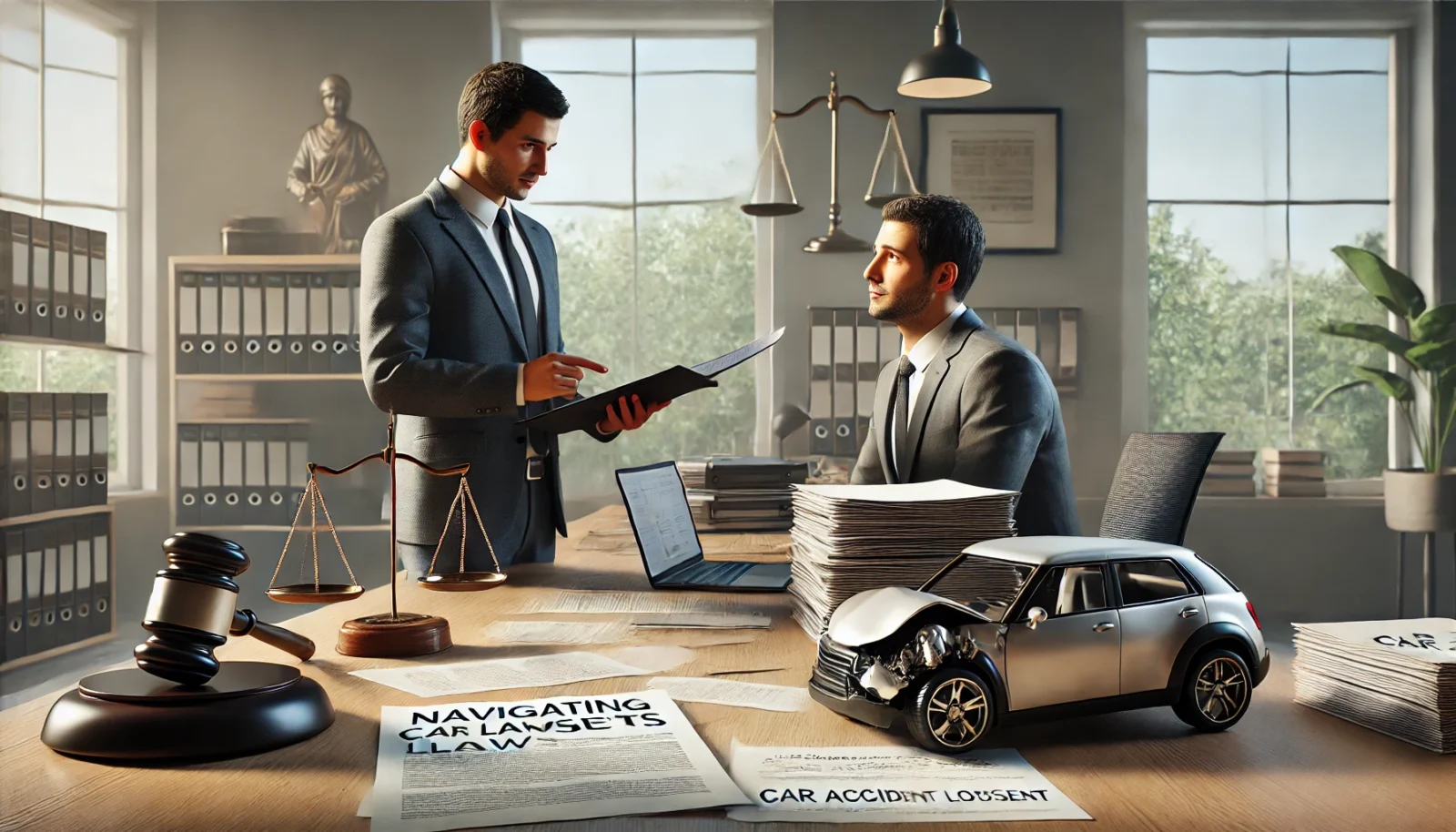Introduction
Car accident lawsuits are legal proceedings that arise when individuals seek compensation for damages, injuries, or losses resulting from a car crash. Understanding how these lawsuits work is crucial for anyone involved in a car accident. The legal process can be complex, and knowing what to expect can make a significant difference in the outcome of your case. A thorough understanding of the car accident lawsuit process helps you protect your rights and ensure you receive fair compensation for your losses.
Types Of Car Accident Lawsuits
Personal Injury Lawsuits Personal injury lawsuits are filed when an individual is injured in a car accident. These cases seek to recover costs related to medical treatment, lost wages, and pain and suffering. To succeed, the injured party must prove that the other driver’s negligence caused their injuries. This involves demonstrating that the driver failed to exercise reasonable care on the road.
Property Damage Claims Property damage claims focus on the damage to your vehicle and any other property damaged in the accident. This type of claim seeks compensation for the cost of repairing or replacing your vehicle and any other property that was affected. The goal is to restore your property to its pre-accident condition.
Wrongful Death Claims Wrongful death claims are pursued by the families of individuals who have died as a result of a car accident. These lawsuits seek compensation for the loss of financial support, companionship, and emotional suffering experienced by the surviving family members. Proving negligence or fault is essential in these cases.
Common Reasons For Car Accident Lawsuits
Negligence Negligence is a primary reason for many car accident lawsuits. It occurs when a driver fails to adhere to traffic laws and standards of care. Examples include running red lights, not signaling turns, or failing to yield. Proving negligence involves showing that the driver’s actions directly led to the accident and caused harm.
Reckless Driving Reckless driving involves behaviors that show a blatant disregard for safety. This can include excessive speeding, aggressive driving, and other dangerous actions. In cases of reckless driving, the driver’s behavior is considered so egregious that it almost always leads to liability for the accident.
Driving Under the Influence (DUI) Driving under the influence (DUI) refers to operating a vehicle while impaired by alcohol or drugs. DUI cases often lead to serious accidents due to reduced reaction times and impaired judgment. If a driver is found to be under the influence, they can be held liable for any resulting injuries and damages.
Distracted Driving Distracted driving is another significant cause of car accidents. This includes activities like texting, talking on the phone, or eating while driving. Distracted drivers are less likely to pay attention to the road, increasing the risk of accidents. Lawsuits involving distracted driving require proving that the driver’s inattention led to the accident.
Key Components Of A Car Accident Lawsuit
Determining Liability Determining liability involves identifying who is responsible for the accident. This can include the driver, vehicle owner, or even a third party, such as a vehicle manufacturer. Evidence such as police reports, accident scene photos, and witness statements helps establish who is at fault.
Gathering Evidence Gathering evidence is crucial in building a strong case. This includes collecting photographs of the accident scene, medical records, repair bills, and any other relevant documentation. Proper evidence helps support your claim and proves the extent of your damages and injuries.
Medical Records and Expenses Medical records and expenses are essential for substantiating your claim. They provide proof of your injuries and the cost of treatment. Keeping detailed records of all medical visits, treatments, and related expenses helps demonstrate the financial impact of the accident.
Witness Statements Witness statements can provide valuable information about the accident. Statements from people who saw the accident can offer an objective perspective on how the accident occurred. These statements can support your case by corroborating your account of the events.
The Legal Process For Filing A Car Accident Lawsuit
Initial Consultation with a Lawyer The initial consultation with a lawyer is the first step in the legal process. During this meeting, you discuss your case and get an overview of your legal options. The lawyer will evaluate the strength of your case and advise you on the best course of action.
Filing a Complaint Filing a complaint is the formal process of starting a lawsuit. You file a legal document with the court that outlines your claims and the relief you seek. This document initiates the legal proceedings and notifies the defendant of the lawsuit.
Discovery Phase The discovery phase involves both parties exchanging information and evidence related to the case. This phase includes depositions, interrogatories, and requests for documents. The goal is to gather all relevant facts to build a case for trial or settlement.
Settlement Negotiations Settlement negotiations are discussions between the parties to resolve the case without going to trial. Both sides may agree on a compensation amount that is acceptable. Settlements can save time and reduce legal costs, but it is important to ensure that any offer fully covers your damages.
Trial Process If a settlement is not reached, the case goes to trial. The trial process involves presenting evidence and arguments before a judge or jury. The court will then make a decision regarding liability and the amount of compensation to be awarded.
How To Choose The Right Lawyer For Your Car Accident Lawsuit
Experience and Specialization When choosing a lawyer for your car accident lawsuit, consider their experience and specialization. A lawyer with a background in handling car accident cases will be more familiar with the nuances of such cases and can provide better representation.
Reputation and Client Reviews Check the lawyer’s reputation and client reviews to gauge their effectiveness and reliability. Positive feedback from past clients can indicate that the lawyer is capable and trustworthy.
Fee Structure and Costs Understand the lawyer’s fee structure and costs before hiring them. Many lawyers work on a contingency basis, meaning they only get paid if you win your case. Clarify how fees and costs are handled to avoid surprises later.
Potential Outcomes And Compensation
Economic Damages (Medical Bills, Lost Wages) Economic damages include tangible costs such as medical bills and lost wages. These damages are calculated based on actual expenses and financial losses incurred due to the accident.
Non-Economic Damages (Pain and Suffering) Non-economic damages compensate for intangible losses like pain and suffering. These damages are more subjective and are calculated based on the impact of the accident on your quality of life.
Punitive Damages Punitive damages are awarded in addition to other damages to punish the at-fault party for particularly egregious behavior. They are less common and are usually reserved for cases involving extreme negligence or recklessness.
Settlement vs. Court Award A settlement is an agreement reached between the parties before going to trial. A court award is the result of a trial, where a judge or jury determines the amount of compensation. Settlements can be quicker but may result in lower compensation compared to a court award.
Common Challenges And Mistakes To Avoid
Delayed Filing Delayed filing can jeopardize your case. Each state has a statute of limitations that sets a deadline for filing a lawsuit. Failing to file within this timeframe can result in losing your right to pursue a claim.
Inadequate Evidence Inadequate evidence can weaken your case. It is essential to gather comprehensive evidence to support your claims and prove the extent of your damages.
Underestimating Your Claims Underestimating your claims can lead to inadequate compensation. Evaluate all aspects of your damages, including long-term effects and future expenses, to ensure you receive fair compensation.
How To Prepare For A Car Accident Lawsuit
Documenting Your Injuries and Damages Documenting your injuries and damages is crucial. Keep detailed records of your medical treatments, repair costs, and any other expenses related to the accident.
Keeping Detailed Records Keeping detailed records of all documents, communications, and evidence related to the accident helps build a strong case. This includes medical bills, repair invoices, and correspondence with insurance companies.
Communicating with Insurance Companies Communicating with insurance companies requires caution. Provide accurate information but avoid agreeing to a settlement offer without consulting with your lawyer first.
The Role Of Insurance Companies In Car Accident Lawsuits
Insurance Claims Process The insurance claims process involves filing a claim with your insurance company. They will assess the damages and determine the compensation you are entitled to based on your policy.
Dealing with Adjusters Dealing with adjusters means negotiating with insurance representatives. They may offer a settlement based on their assessment of the damages and liability.
Understanding Policy Limits Understanding policy limits helps you know the maximum amount that can be claimed under your insurance policy. This affects the compensation you can receive and may influence how you approach settlement negotiations.
Legal Advice And Resources
Finding Legal Aid Finding legal aid can assist if you cannot afford a lawyer. Look for organizations or services that offer free or low-cost legal assistance for those in need.
Online Resources and Support Groups Online resources and support groups provide valuable information and emotional support. They can offer guidance and connect you with others who have experienced similar situations.
State-Specific Laws and Regulations State-specific laws and regulations impact how car accident lawsuits are handled. Familiarize yourself with local laws to ensure you follow the correct procedures and meet all legal requirements.
Conclusion
In conclusion, understanding the car accident lawsuit process is vital for anyone involved in a car crash. Knowing the types of lawsuits, common reasons for filing, and the legal process can help you navigate your case more effectively. Seeking professional legal assistance is crucial to ensure you receive fair compensation for your injuries and losses. With the right knowledge and support, you can manage your car accident lawsuit successfully.
Faqs About Car Accident Lawsuits
How Long Do I Have To File A Car Accident Lawsuit?
You generally have a limited period to file a lawsuit, known as the statute of limitations. This period varies by state, so it is important to act promptly.
What If The Other Driver Doesn’t Have Insurance?
If the other driver is uninsured, you may still be able to recover compensation through your own insurance policy or other legal avenues.
Can I Handle A Car Accident Lawsuit Without A Lawyer?
While it is possible to handle a car accident lawsuit on your own, having a lawyer can significantly improve your chances of obtaining fair compensation.
What Should I Do If I Receive A Settlement Offer?
If you receive a settlement offer, review it carefully and consult with your lawyer before accepting. Ensure that the offer covers all your damages and future needs.
To read more, visit our blog page. We do have more topics!












Got a Questions?
Find us on Socials or Contact us and we’ll get back to you as soon as possible.